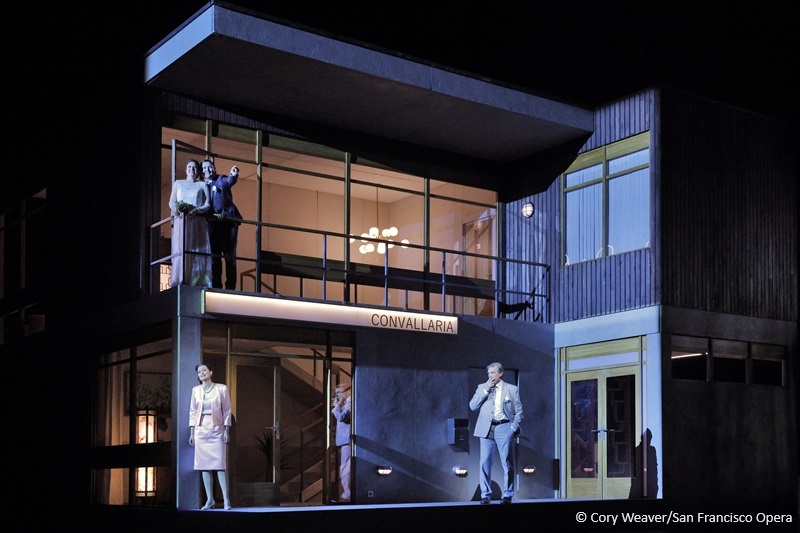
A NEW OPERA ON THE TOO-FREQUENT TRAGEDY
Kaija Saariaho, one of the most poetic of composers in recent decades, created the operatic tragedy “Innocence” dwelling on one of the most painful episodes of recent years: in-school shootings, with a libretto initially by Sofi Oksanen, then reworked and adapted by Saariaho’s gifted son, Aleksi Barrière. Saariaho is best known for her earlier and widely played opera “L’amour de loin” (The Distant Beloved).
The current one, in its U.S. premiere June 1, could not be timelier; our stages have cried for some such dramatization of a recurrent post-Millennium phenomenon: school shootings by an unbalanced student (long teased as the “Frog-Boy”) with dreadful loss of life. “Innocence” deals with this in every way emotionally, from the grief in the whole community, the traumatization of the victims’ relatives and neighbors, the guilt of those who never spoke up despite warning signs, recriminations, and the long term psychological wounds of those suppressing and trying to forget (in short, PTSD).
All of this emerges in one aching burst of 105 minutes without intermission or stage resetting.
To underline the universality of such shootings, Barrière fashioned a unique libretto ranging over nine European languages, sung and spoken (and also done with in-between Sprechstimme) by the unwieldy cast of 21 principals—confusion on two levels. The shooting details are cleverly suppressed in the early going, providing a provocative musical mystery on a too-realistic staging, in the gut-wrenching scenes of attack. It’s all there but for the gunfire and blood.
The premiere was bolstered by the ingenious rotating single-set two-story structure created by designer Chloe Lamford under producer Simon Stone. Scenes changed instantly via on-off lights in different rooms.
On opening night there was little to cheer about; even the applause at the final curtain was more tepid than torrid.
By forgoing the more common finale crescendos, composer Saariaho left many a listener with a sense of emptiness——-Yes, the mystery was unraveled, including long-suppressed family secrets and a survivor’s guilt-ridden marginal complicity, all contrasted with the jolly opening wedding scene. Yet the opera eventually fades out with hardly a murmur, much like Wozzeck drowning himself in Berg’s similarly named opera. Given the compelling lovely brooding softness of the overture establishing the compositional spurs, a contrasting burst of vitality would have provided a far more suitable ending. Furthermore, the composer was content simply to set conversations to music in a method that was neither absorbing nor attractive, devoid of arias, duets or ensembles.
Yes, the story simply had to be told—–but ideally using somewhat different tools. Miles away from the more familiar Italian or German traditions, her somber musical palette is stylistically closer to Debussy, Fauré, Messiaen, Bartok and the nebulousness of early Schoenberg. After her many years living in France, a French musical influence was hardly a surprise.
Conductor Clément Mao-Takacs plumbed the low registers in the orchestra with feeling. The major roles were sung by Ruxandra Donose (the denouement waitress Tereza), the focal tenor Miles Mykkanen (Tuomas), the soprano Lilian Farahani as the bride, Lucy Shelton (teacher), Vilma Jȁȁ (as the ill-fated student Marketa) and the familiar veteran baritone Rod Gilfry (Henrik). Louise Bakker was stage director.
MUSIC NOTES—This is only the third mainstage opera here composed by women. Previously it was Rhiannon Giddens and Gabriela Lena Frank, all three during the current Matthew Shilvock era….As the conductor has pointed out, “each character has its own definition, tempo, expression, dynamics, rhythm,” all meticulously laid out in advance by Saariaho on graph paper….This opera tragedy about deaths in school is also the epitaph for the Finish composer, who died a year ago at age 70….The many languages used reflect the multiplicity of survivors’ reactions, per Barrière. It also suggests that such attacks are not merely an American phenomenon….If trauma lurks nearby, the SFO is prudently offering post-show activations giving opportunities for advocacy, dialogue and reflection.
Saariaho’s opera “Innocence” in US premiere, playing June 1-21, San Francisco Opera, at Opera House, San Francisco. For SFO info: (415) 864-3330, or go online www.sfopera.com.